English Words in Action, Group M
(a variety of English words which have developed through history and are currently used in our modern age)
Simply click on this banner (or the following link) and you will be on your way to stimulate your brain for greater word comprehension with quizzes based on some of the words in this unit.
Jim meted out a certain amount of money to his children every week so they would learn to spend wisely and to save for future financial needs or desires.
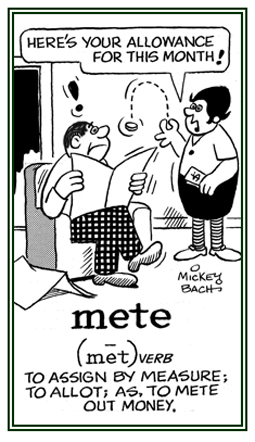
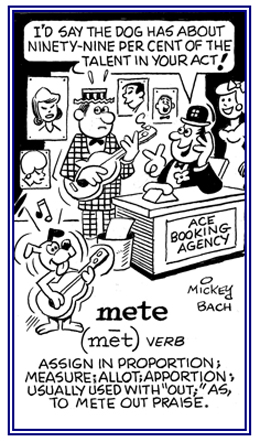
Go to this Word A Day Revisited Index
so you can see more of Mickey Bach's cartoons.
2. An important event or turning point in one's history or career, or that of nations: The invention of new military weapons are milestones of mankind's route to self-destruction.
2. A subordinate or minor official: The real estate owner sent his minion to check on the house to see if the property was salable.
3. A person who is not considered powerful or important and who obeys the orders of a powerful boss or leader: One of the chief executive officer's minions was assigned to work out the financial details for a special project.
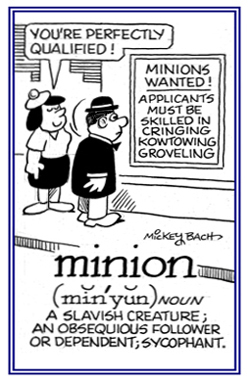

Go to this Word A Day Revisited Index
so you can see more of Mickey Bach's cartoons.
2. To say or to pronounce words in an incorrect manner or to express improperly: Because the librarian tends to misspeak so often, Albert wonders if he really knows how often he misinforms his visitors.
3. To speak otherwise than according to one's intention: The politician tends to misspeak so often his credibility is questionable.
If the imperfectly expressed thought, whether an amusing blooper or a serious gaffe, is unintentional and a mere slip of the lip; then such misspeaking should not be considered lying.
2. To frustrate, to confuse or to disappoint: Peter's irresponsible behavior mocks Karin's trust in him.
3. To arrange for training or practice; or performed as a demonstration: Web designers and innovators mock up something, put it online, and get immediate feedback from users which makes a full-scale working model of something so it can undergo testing and be used to improve the program. 4. Etymology: from the mid-15th century, "make fun of", from Old French mocquer "to deride, to jeer"; of unknown origin.
Revealing the politician's bribery in order to run for office made a mockery of the contest.
When anyone makes a mockery of something, he or she makes it seem ridiculous or useless.
When it started to rain, it became a moot decision as to where Jim and his family would have their picnic .
2. Etymology: originally in Anglo Saxon days, a moot point was one which was talked about at a "meeting" because "meeting" is the original sense of the noun moot, a town meeting for purposes of debating and discussing issues.in the Dictionary of Word Origins; Arcade Publishing;
New York; 1990; page 354.
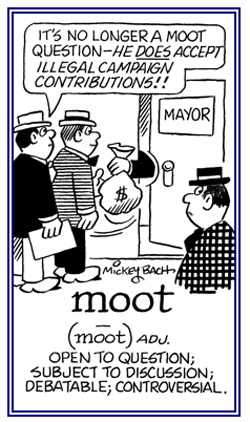
Go to this Word A Day Revisited Index
so you can see more of Mickey Bach's cartoons.
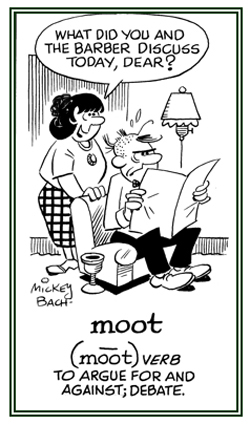
Go to this Word A Day Revisited Index
so you can see more of Mickey Bach's cartoons.
2. A shy, inconspicuous, unobtrusive person: Poor Susan, she is such a mouse at parties and even when she is in a group with other people.
Actually, Mike had two different mouses, one with a connecting cord and one which was cordless.
2. To look for, to hunt for something, or someone in a quiet, stealthy manner: The cats moused around the barn looking for small rodents.
3. Using a hand-held computer device to control the movement of a pointer on the computer screen which, when rolled along a flat surface, directs an indicator to move correspondingly around a computer screen, allowing the operator to move the indicator freely so he or she can select operations or manipulate text or graphics: While the technicians were mousing around on the new computer, they were able to determine if the quality had really improved as claimed by the computer company.
Thomas is a person who mouses for hours at a time at work and at home; in fact, his wife once told a friend that they both mouse on their separate computers.
Another farmer was using his mowing equipment first to reap his wheat and then his oats.
An MP also indicates "mounted police" who ride horses when performing special duties as civilian police.
2. A member of a government group in such countries as Great Britain, Canada, etc.: The MP is a Member of Parliament which is the highest legislature in the UK consisting of the sovereign, the House of Lords, and the House of Commons.Links to all of the groups of English words in action, Groups A to Z.
You may see the bibliographic list of sources of information for these words in action.


